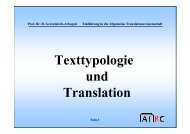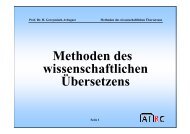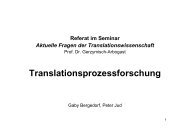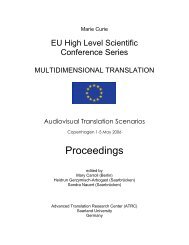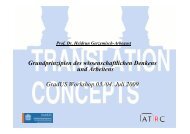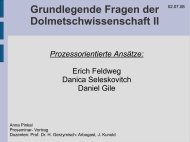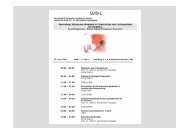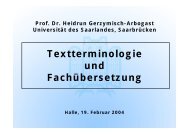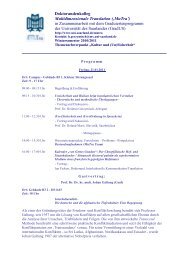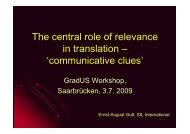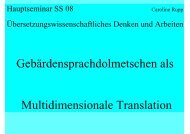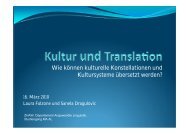Proceedings - Translation Concepts
Proceedings - Translation Concepts
Proceedings - Translation Concepts
You also want an ePaper? Increase the reach of your titles
YUMPU automatically turns print PDFs into web optimized ePapers that Google loves.
MuTra 2005 – Challenges of Multidimensional <strong>Translation</strong>: Conference <strong>Proceedings</strong><br />
Mira Kadric<br />
criminal proceedings. According to the Council and the Commission these parameters contain<br />
mechanisms for the legal protection of suspects as well as the prescribed common minimum<br />
standards.<br />
As professional mobility, tourism, migration and refugee movements are reaching new<br />
heights, the number of foreign defendants is also increasing in all the member states. The<br />
Commission is thus working on common minimum standards and putting the emphasis on the<br />
appropriate protection of foreign suspects and defendants. Organized crime is also<br />
increasingly spreading across the borders.<br />
In February 2003 the Commission presented a Green Paper on Procedural Safeguards for<br />
Suspects and Defendants in Criminal <strong>Proceedings</strong>. 2 The aim of the Commission is to<br />
harmonize the rights of suspects and defendants on the basis of already existing international<br />
agreements (European Convention on Human Rights, Charter of Fundamental Rights of the<br />
European Union). The Commission’s primary goal is to establish minimum standards. The<br />
legal basis of the proposal is article 31 of the Treaty on European Union in the version of the<br />
Treaty of Nice, which includes common action in the field of judicial cooperation regarding<br />
criminal cases. According to the Commission, the proposal for a framework decision<br />
represents the necessary addition to the measures regarding mutual recognition, whose aim is<br />
to improve the efficiency of criminal prosecution. The procedural rights determined in the<br />
proposal for a framework decision can be divided into five areas:<br />
1. the right to (free) legal advice<br />
2. the right to the interpretation and translation of important documents<br />
3. the right of persons who are not capable of understanding or following the<br />
proceedings to receive appropriate attention<br />
4. the right to communicate, inter alia, with consular authorities in the case of foreign<br />
suspects,<br />
5. the right to information.<br />
The right to interpretation and translation of important documents, which is dealt with in<br />
chapter 2, regards all the stages of a proceeding, including meetings with the legal adviser.<br />
The text of the proposal determines expressly that the right to make use of the services of an<br />
interpreter free of charge also applies to persons with a hearing disorder or a speech defect.<br />
This means that this right also encompasses sign language interpretation. As regards the right<br />
to free translations, the draft determines that the responsible authority decides which<br />
documents have to be translated. However, the legal adviser of the suspect has the right to<br />
demand the translation of further documents (article 7, clause 2 of the draft). 3<br />
Additionally, the draft prescribes expressly the consultation of sufficiently qualified<br />
translators and interpreters. Article 9 of the draft also contains a real innovation in this field –<br />
the use of audio and video recordings in all proceedings in which translators and interpreters<br />
have to be called in. In case of dispute, the parties would receive a copy of the recording.<br />
Otherwise, the recording would only be used for checking whether the interpretation has been<br />
carried out correctly. The Commission has thus clearly advocated an up-to-date interpretation<br />
of article 6, paragraph 3 lit e ECHR (Convention for the Protection of Human Rights and<br />
Fundamental Freedoms), which, up to now, has not been enforced in the practice of criminal<br />
2 Cf. COM(2003)75 final from 19 February 2003.<br />
http://eur-lex.europa.eu/LexUriServ/site/en/com/2003/com2003_0075en01.pdf<br />
3 For Austria and for Germany the issue of the amount of interpretations and translations is very relevant because<br />
Austria and Germany have already been convicted in this context before the European Court of Human Rights<br />
(case Kamasinski vs. Austria, verdict of the European Court of Human Rights from 19 December 1989; case<br />
Öztürk vs. Federal Republic of Germany, verdict of the European Court of Human Rights from 21 February<br />
1984).<br />
175




